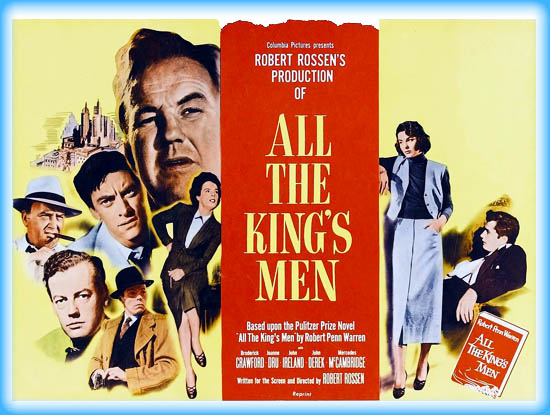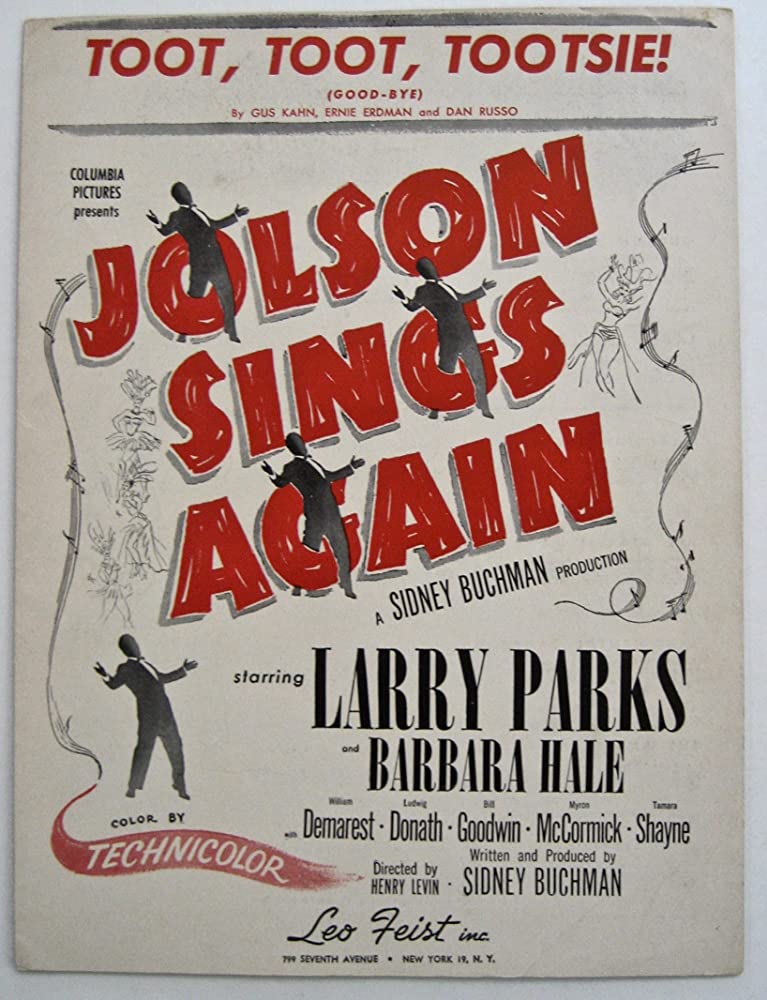1949
And The Oscar Goes To…
Well… the book this was based on (lots of the movies we’ve tackled are based on books, I haven’t been mentioning that…) won a Pulitzer, that must be worth something, right?
All The Kings’s Men tells the story of Willie Stark, through the eyes of a reporter named Jack who becomes his right hand man. Stark starts out as a simple poor farmer who just wants to do right by his neighbours. He runs for governor against an entrenched, corrupt circle of good ol’ boys, but loses badly; gets conned into running again by said entrenched good ol’ boys in order to split the “hick vote,” their words not mine, and then runs a third time having learned that the only way to get anything done in politics is to become a cruel monster, stomping on whoever he needs to in order to… build schools and hospitals? It’s like when we found out the Injustice Society in Stargirl was after climate change reform and universal health care. Like, yeah he’s a bad person now, but… Anyway, eventually his many sins catch up with him, but he goes Full Dictator in an attempt to avoid consequences, and Jack spends several years too long figuring out that maybe he’s on the wrong side.
It’s weirdly balanced, is the problem. We speed through the first eight years, the period when repeated losses to sinister rich fatcats wear down what decency Willie had in the beginning, and spend most of the movie with the corrupt monster of civic infrastructure projects he becomes. We don’t watch a good man gradually turn bad because power corrupts, Willie goes Full Kingpin in an eyeblink and we spend most of the movie waiting for Jack to notice. It’s not a parable of how power corrupts, it’s House of Cards without nuance.
Also, Willie trying to buck impeachment by radicalizing his hick followers and maybe planning a coup is… well it’s more prescient than we’d like.
There’s also a subplot where Jack’s childhood sweetheart ends up having an affair with Willie but come on, Jack, ten years pass between the top of the movie and Willie stealing your girl. Movie leads in the 40s get married after a week, what were you waiting on?
Here’s some thoughts from Twitter.
How Green Was Their Valley? Nobody’s Valley was Green, everyone’s Valley was thick with toxic sludge.
And Rotten Tomatoes Says: They put it at 41/93, based largely on Broderick Crawford’s performance as Willie Stark, and honestly, that feels way too generous.
The Box Office Champ
No, not a movie starring Al Jolson. A movie about Al Jolson. A Musical Biopic– no, no. Worse than that, if such a thing can exist… The sequel to a Musical Biopic. I can’t think of a second example of that. Nobody’s considering Bohemian Rhapsody 2: Who Wants To Live Forever, or Rocketman 2: Circle of Life, and that one wouldn’t involve watching an icon die from AIDS. But apparently The Jolson Story was popular enough to demand we check back in on Jolson’s post-retirement return to showbiz.
Short version: picture that sequel I mentioned to Bohemian Rhapsody existed, and ended with a 20 minute scene of the rest of Queen watching the premiere of Bohemian Rhapsody then soaking in the Oscar buzz, and basically you have Jolson Sings Again.
So in The Jolson Story, as an opening title card sums up, Al Jolson had to choose between his two great loves, singing and his wife, he tried to quit singing but his wife decided what he really loves is show business and left him, and that’s where we open. From there we just watch him bounce in and out of retirement, have health issues, and deal with his continuing slide out of relevance, until towards the end we reach the filming of The Jolson Story, including Jolson wrapping his head around him re-recording his songs so some actor could lip-synch them while playing him, and it was so meta it made my head hurt, and that was before the actor Larry Parks (the guy who played Jolson in both movies) showed up playing himself when Jolson came to watch the dailies from The Jolson Story. Jolson as played by Parks watches Parks playing Jolson then meets Parks playing Parks and Jesus Christ, why. The last act of this movie is just a clip show of the last movie. Jolson Sings Again is a goddamned ouroboros.
Look, I’m no fan of musician biopics, but I’ll give them this… most have the sense to cut to a text epilogue and end credits before reaching, well, all of this. They don’t put this part in the movie, or if they do, they limit it to the last five minutes, they don’t make a 90 minute movie about it. This was just an elaborate excuse to watch Parks lip-synch a bunch of Al Jolson songs. Again. It was our fifth film in full colour, but that just lets us drink in how offensive the blackface is when we hit the interminable final act.
It’s somehow worse than I thought it would be. It’s 91 minutes but felt longer than Gone With the Wind. 1949 may not have had that much going for it, film-wise, but couldn’t they have done a little better than this? Ugh. Bad year to end the decade on. Last entry ended with Gone With the Wind, this one ends with two movies that added together are shorter than it but both still made me say “Son of a bitch, how am I only halfway through this?”
How Green Was Their Valley? The Green Valley was in the last movie. Nothing but gradually falling autumn foliage over here.
And Rotten Tomatoes Says: All five reviews were positive!? “About as good as a sequel can be!?” You’re a crazy person, Bob Thomas of the Associated Press, you go to a dungeon.
Other Events in Film
Did you know that Mr. Belvedere was based on books? And that they made several movies on those books decades before Mr. Belvedere was a sitcom? Did everyone else forget that Mr. Belvedere was a thing for several years? Anyway Mr. Belvedere Goes to College, the third such movie, made it to number seven at the 1949 box office.
Yes, well-spotted, obviously nothing of note happened if I’m doing deep-cut Mr. Belvedere trivia.
Next Page: Wrap-up thoughts



One thought on “Art Vs Commerce: How Green Was the Golden Age? (1940s)”